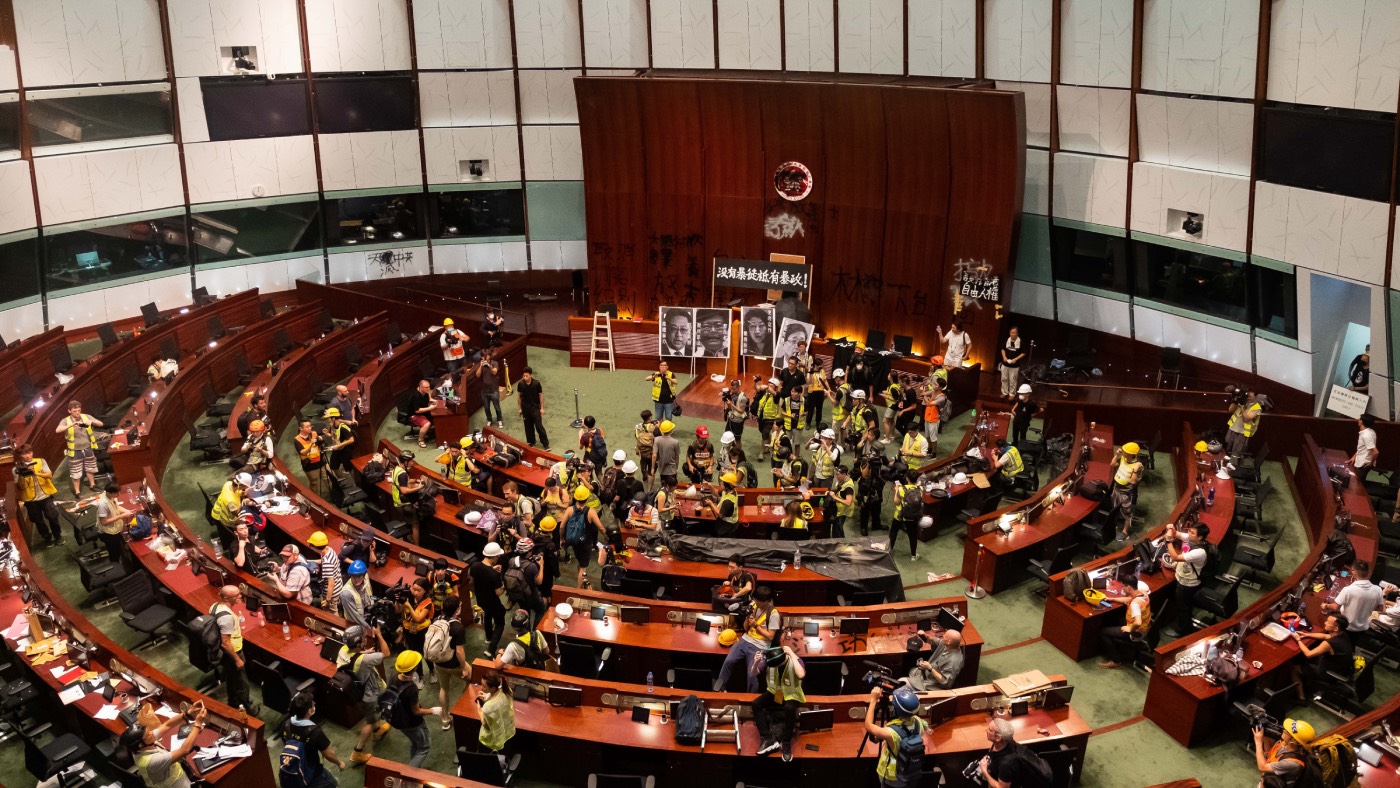Hong Kong protests: Chinese state media calls for ‘zero tolerance’
Territory’s leader Carrie Lam condemns protestors who occupied government building

A free daily email with the biggest news stories of the day – and the best features from TheWeek.com
You are now subscribed
Your newsletter sign-up was successful
The Chinese media has called for “zero tolerance” after protestors in Hong Kong stormed and vandalised the territory's parliament on Monday night.
Hong Kong's leader Carrie Lam has accused protestors of “extreme use of violence” after the demonstrators tore down portraits and spray-painted pro-democracy slogans in the main chamber on Monday afternoon. Police eventually regained control by firing tear gas and charging at demonstrators.
The Times describes the uprising as “an unprecedented challenge to China’s Communist rulers,” while CNN predicts further unrest among the young protestors who have been “invigorated” by the partial victories they scored in the campaign against the extradition bill.
The Week
Escape your echo chamber. Get the facts behind the news, plus analysis from multiple perspectives.

Sign up for The Week's Free Newsletters
From our morning news briefing to a weekly Good News Newsletter, get the best of The Week delivered directly to your inbox.
From our morning news briefing to a weekly Good News Newsletter, get the best of The Week delivered directly to your inbox.
The protests represent a “personal challenge” to China’s leader Xi Jinping, The Guardian says. The “scale and persistence of the unrest, combined with growing street violence, may force him to get involved – or risk losing his ‘strongman’ image”, the paper adds.
Ms Lam said the sight of protestors occupying the legislature “really saddens... and shocks a lot of people”. The activists had defaced the emblem of Hong Kong, raised the old British colonial flag and shattered furniture.
Lam added that the actions of those who broke in were “something that we should seriously condemn, because nothing is more important than the rule of law in Hong Kong”.
She contrasted Monday's dramatic events with the annual handover commemoration march on 1 July, which she said reflected “the core values we attach to peace and order” in Hong Kong.
A free daily email with the biggest news stories of the day – and the best features from TheWeek.com
“I hope the community at large will agree with us that with these violent acts that we have seen, it is right for us to condemn it, and hope society will return to normal as soon as possible," she added.
The Chinese media has called for “zero tolerance” approach to the protests. “Out of blind arrogance and rage, protestors showed a complete disregard for law and order,” the Global Times, published by the ruling Communist Party’s People’s Daily, said in an editorial.
Hong Kong was returned to Chinese rule in 1997, but it is still administered separately under an arrangement known as “one country, two systems”. This means the city enjoys freedoms and rights unheard of on the autocratic mainland, but many residents believe Beijing is preparing to renege on that deal.
The response from Britain has reflected these concerns. British Foreign Secretary Jeremy Hunt, said: “I’ve never had to fight for my freedom. We can’t take freedoms for granted. Seeing those scenes, my heart goes out to those worried they’ll lose their precious way of life. I don’t support violence in any circumstances but I understand their worries about changes happening in Hong Kong.”
-
 What to know before filing your own taxes for the first time
What to know before filing your own taxes for the first timethe explainer Tackle this financial milestone with confidence
-
 The biggest box office flops of the 21st century
The biggest box office flops of the 21st centuryin depth Unnecessary remakes and turgid, expensive CGI-fests highlight this list of these most notorious box-office losers
-
 What are the best investments for beginners?
What are the best investments for beginners?The Explainer Stocks and ETFs and bonds, oh my
-
 Epstein files topple law CEO, roil UK government
Epstein files topple law CEO, roil UK governmentSpeed Read Peter Mandelson, Britain’s former ambassador to the US, is caught up in the scandal
-
 Iran and US prepare to meet after skirmishes
Iran and US prepare to meet after skirmishesSpeed Read The incident comes amid heightened tensions in the Middle East
-
 Israel retrieves final hostage’s body from Gaza
Israel retrieves final hostage’s body from GazaSpeed Read The 24-year-old police officer was killed during the initial Hamas attack
-
 China’s Xi targets top general in growing purge
China’s Xi targets top general in growing purgeSpeed Read Zhang Youxia is being investigated over ‘grave violations’ of the law
-
 Panama and Canada are negotiating over a crucial copper mine
Panama and Canada are negotiating over a crucial copper mineIn the Spotlight Panama is set to make a final decision on the mine this summer
-
 Why Greenland’s natural resources are nearly impossible to mine
Why Greenland’s natural resources are nearly impossible to mineThe Explainer The country’s natural landscape makes the task extremely difficult
-
 Iran cuts internet as protests escalate
Iran cuts internet as protests escalateSpeed Reada Government buildings across the country have been set on fire
-
 US nabs ‘shadow’ tanker claimed by Russia
US nabs ‘shadow’ tanker claimed by RussiaSpeed Read The ship was one of two vessels seized by the US military